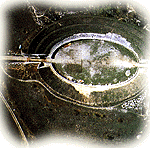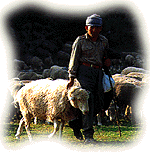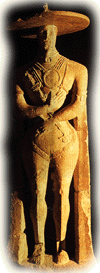 |

|
|
THE PEOPLE OF ABRUZZO |
|
| Abruzzo was already inhabited in the age of prehistory, when the changes of climate made the inland mountainous areas inhospitable. The main traces of the presence of man during the palaeolithic period were found in sites in the valleys that opened onto the sea (the valleys of the river Vibrata in the province of Teramo, the river Pescara, and the river Foro in the province of Chieti). The advent of the neolithic period brought a gradual transformation of the primitive economy based on hunting and gathering crops; farming and sheeprearing activities were developed and more permanent settlements were formed. Meanwhile, the easy navigability of the Adriatic favoured the arrival of culturally more developed peoples from Illyria. The so-called "Ripoli culture" was particularly widespread in Abruzzo, originating from a place near Corropoli in the valley of the Vibrata. This culture bears witness to the intense commercial relationships of these peoples and shows the mixed character of their economy, based on both sheep-rearing and farming, which is accentuated in the later Bronze Age (neolithic). This characteristic type of economy has remained unchanged up to the present day. We know that in the Iron Age the people were divided into tribes of "Italic" or Sabellian stock, representants of which were also living in Molise, the eastern part of Umbria and the area of Latium South of the Tiber. Their warlike nature was perhaps a consequence of the shepherds' need to pass through the territories of other tribes or peoples during the periods of transhumance along the sheeptracks. This is borne out by the custom of always burying adult males with their weapons and by a tradition which has been handed down since the time of the first Roman historians during the Republic: "Marsa manus, Peligna cohors, Vestina avirum vis", wrote Quintus Ennius. "Nec sine Marsos, nec contra Marsos", meant that no Roman victory was possible without the aid of the Marsi, the closest neighbours of the Urbs, nor any victory against the Marsi. They were in fact the first allies of their Roman cousins. The people on the Tiber who founded Rome were of Italic stock; combined with the intellectuality of the Etruscan aristocracy, they contributed that force of character, intense realism, sense of discipline and tenacious stubornnes that are still characteristic of the farmers of Abruzzo, to the extent that they have been defined the "Germans of the South". Their loyalty to Rome after the tragic defeat at Cannae, and the passing of Hannibal and many of their allies, "made it possible for the Empire to survive", as Titus Livius wrote. The statue of the "Warrior of Capestrano" in the modern National Archaeological Museum at Chieti is emblematic. It is a funerary monument of the 6th century BC representing a warrior with all his weapons for attack and defence. He carries a short sword from which the typical Roman "gladium" was to develop, two javelins that were also to become part of the armour of the Roman infantry, the fighting axe typical of the Bronze Age Apennine people, a disc-shaped breastplate protecting his heart which between the 6th and the 3rd century BC was to evolve into the three discs of the "Samnite" breastplate and later into the Roman anatomical cuirass. Even today in the paelignean valley of Sulmona (Ovid's "Sulmo mihi patria est") and in the territory of the Marsi, on the hilltops we can still see numerous enclosures fortified with huge stone walls where people and animals used to take refuge in times of danger. In 1860, the "squareshouldered taciturn folk", as D'Annunzio was to define them, abandoned by their officers who had fled to Naples, were the last Bourbon rampart to yield to the forces of Piedmont in the fortress at Civitella del Tronto, two months after the fort at Gaeta had surrendered with the flight of the king, "Franceschiello". The peasant shepherds coul not understand the romantic idea of a united Italy. Their stubborn resistance was defined by their conquerors as "brigandage".
|
||



